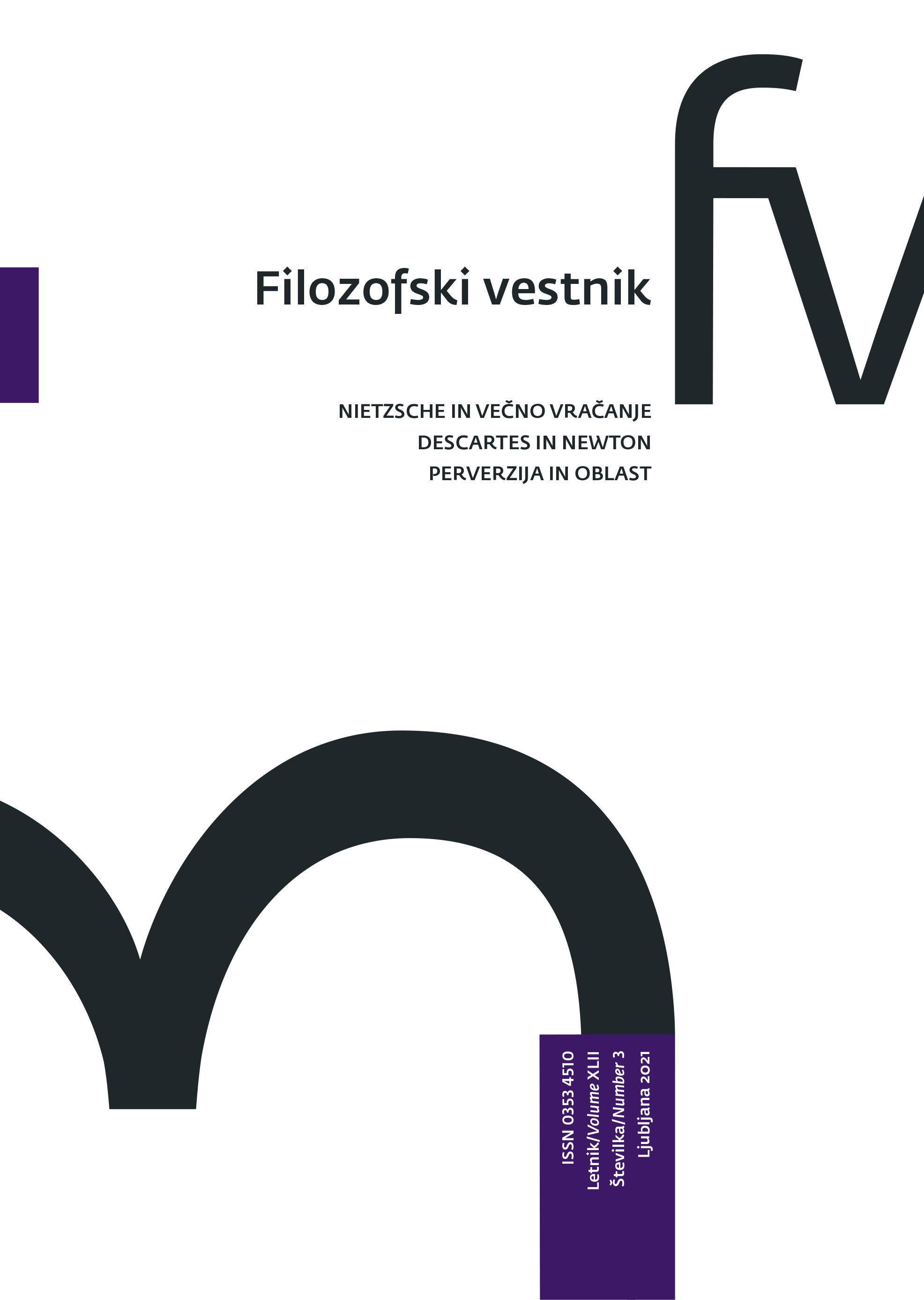Nietzsche, Wagner, kompozicijski miniaturizem
DOI:
https://doi.org/10.3986/fv.42.3.05Ključne besede:
Wagner, Nietzsche, glasbeni miniaturizem, dekadenca, glasbena dramaPovzetek
Nove oblikoslovne rešitve (ali manko le-teh), ki jih je prinesla reforma opere v glasbeno dramo, burijo duhove že od samega nastanka zrelih Wagnerjevih del (Nibelungov prstan, Tristan in Izolda, Mojstri pevci nürnberški, Parsifal). Najbolj slavno formulacijo očitka dozdevne skladateljeve pomanjkljive veščine obvladovanja velikih form je artikuliral Friedrich Nietzsche, ki v Primeru Wagner poda diagnozo miniaturizma kot glavne kompozicijske značilnosti ali pa kar splošnega simptoma Wagnerjevega dekadentnega sloga. V prispevku se bomo s pomočjo analiz, ki jih najdemo v zajetni študiji muzikologa Karola Bergerja, ozrli na zgodovinski kontekst te pripombe, pretehtali njeno splošno ustreznost ter nazadnje osvetlili pot in zagate umetnika in filozofa, ki v drugi polovici 19. stoletja vsak na svoj način iščeta nova bežišča po zatonu razsvetljenske vere v moč razuma.
Prenosi
Literatura
Adorno, Theodor W., »O knjigi, ki je sprožila toliko razprav«, v S. Širca (ur.), Spisi o Wagnerju, prev. S. Širca, Nova Gorica, Založba Univerze v Novi Gorici, 2015, str. 311–314.
Adorno, Theodor W., »Poskus o Wagnerju«, v S. Širca (ur.), Spisi o Wagnerju, prev. S. Širca, Nova Gorica, Založba Univerze v Novi Gorici, 2015, str. 187–310.
Berger, Karol, Beyond Reason: Wagner contra Nietzsche, Oakland, University of California Press, 2017.
Lorenz, Alfred, Das Geheimnis der Form bei Richard Wagner. Zv. 1: Der musikalische Aufbau des Bühnenfestspieles ʻDer Ring des Nibelungen’; Zv. 2: Der musikalische Aufbau von Richard Wagners ʻTristan und Isolde’; Zv. 3: Der musikalische Aufbau von Richard Wagners ʻDie Meistersinger von Nürnburg’; Zv. 4: Der musikalische Aufbau von Richard Wagners ʻParsifal’, Berlin, Max Hesse, 1924–1933; ali ponatis: Tutzing, Hans Schneider,
Mann, Thomas, »Trpljenje in veličina Richarda Wagnerja«, v S. Širca (ur.), Spisi o Wagnerju, prev. S. Širca, Nova Gorica, Založba Univerze v Novi Gorici, 2015, str. 104–154.
McClatchie, Stephen, Analyzing Wagner's Operas: Alfred Lorenz and German Nationalist Ideology, Rochester, University of Rochester Press, 1998.
Nietzsche, Friedrich, »Primer Wagner«, v F. Nietzsche, Somrak malikov, Primer Wagner, Ecce homo, Antikrist, prev. J. Moder, Ljubljana, Slovenska matica, 1989.
Nietzsche, Friedrich, Človeško, prečloveško, prev. A. Leskovec, Ljubljana, Slovenska matica, 2005.
Nietzsche, Friedrich, Richard Wagner in Bayreuth, prev. R. J. Hollingdale, v Friedrich Nietzsche, Untimely Mediatations, Cambridge, Cambridge University Press, 2007, str. 195–254.
Nietzsche, Friedrich, »Fragmenti iz zapuščine: pomlad – jesen 1881 [odlomki]«, prev. T. Troha, Filozofski vestnik, 43 (3/2021), str. 7–24.
Pompe, Gregor, »Wagner v luči revolucije kot temelja umetnosti«, v R. Wagner, Umetnost in revolucija: Izbrani spisi, Ljubljana, Studia Humanitatis, 2014, str. 279–320.
Wagner, Richard, Gesammelte Schriften und Dichtungen, zvezek 10, Leipzig, Walter Tiemann, 1907, dostopno na: https://archive.org/details/gesammelteschrif10wagn/.
Wagner, Richard, Umetnost in družba: Izbrani spisi, Ljubljana, Studia humanitatis, 2014.
Prenosi
Objavljeno
Verzije
- 2022-04-06 (2)
- 2021-12-31 (1)
Kako citirati
Številka
Rubrike
Licenca
Avtorske pravice (c) 2021 Avtorji

To delo je licencirano pod Creative Commons Priznanje avtorstva-Nekomercialno-Brez predelav 4.0 mednarodno licenco.
Avtorji jamčijo, da je delo njihova avtorska stvaritev, da v njem niso kršene avtorske pravice tretjih oseb ali kake druge pravice. V primeru zahtevkov tretjih oseb se avtorji zavezujejo, da bodo varovali interese založnika ter da bodo povrnili morebitno škodo.
Podrobneje v rubriki: Prispevki





